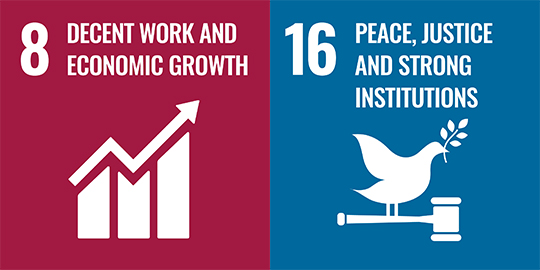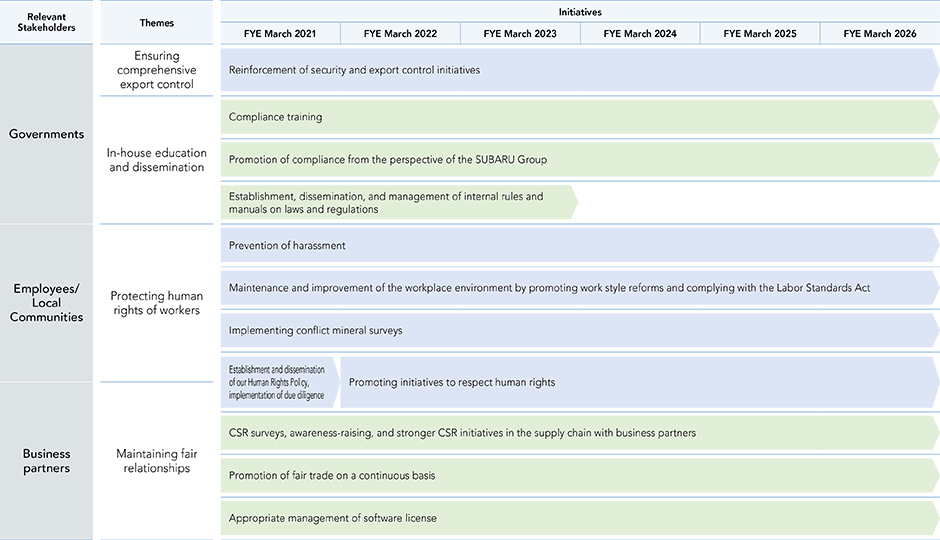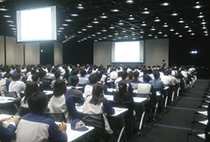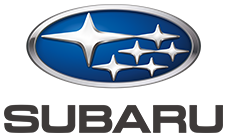SUBARU Group’s Six Priority Areas for CSR: Compliance
Basic Concepts, KPIs, and Relevant SDGs
| Basic Concepts | KPIs | Relevant SDGs |
|---|---|---|
| SUBARU will become a company that operates in accordance with laws, regulations, and social norms, ensuring that our focus on compliance as a priority permeates throughout and is practiced by all those who work for the SUBARU Group. |
|
 |
Why It Is Important to Us
Having reflected on the previous lack of awareness of social norms in the execution of our duties, flaws in our internal rules, and the inadequate understanding of laws and regulations relevant to our operations, SUBARU is keenly aware of the need to change ways of thinking and completely change the culture. SUBARU will dedicate the whole of the SUBARU Group to promoting initiatives focused on compliance as a priority, with the aim of ensuring that SUBARU resonates with and inspires trust in our customers and all other stakeholders.
Activities in the Six Priority Areas for CSR

TOPICS
Aiming for the sustainable growth of the SUBARU Group through legal compliance and respect for human rights
Toward a corporate group that is trusted and looked up to by society through the sincere actions of each employee
Conducting sound and fair corporate activities under an effective compliance system
SUBARU positions compliance as one of its most important management issues in order to maintain its standing as a corporate group that is trusted by and resonates with all stakeholders. We are committed to instilling a commitment to compliance with laws, regulations, internal rules, and social ethics and norms in the actions of every executive officer and employee of the SUBARU Group. We are keenly aware that any violation of laws or regulations could directly impact our corporate value, and therefore promote a management approach that respects the individuality and human rights of all those engaged in SUBARU's business activities. We also strongly recognize that the thorough enforcement of compliance across the organization serves as the bedrock of our management as we aim for highly sound business operations.
In promoting compliance activities, we have established a compliance policy consisting of three principles: (1) Deepen dialogue with everyone and promote the Think Compliance initiative; (2) Maintain awareness of being one member of the SUBARU Group, unbound by organizational frameworks; and (3) Act with consideration for others and a positive attitude of doing good. To support these activities, we strive to promote compliance awareness among employees through compliance training and practical legal training. In FYE March 2023, we implemented online training due to COVID-19. Approximately 30,000 Group employees in Japan participated, deepening their understanding of compliance. SUBARU also distributes and utilizes various practical support tools such as the Compliance Manual (available in Japanese and English) as a common guideline for all employees. In addition, to ensure strict compliance with laws and regulations and appropriately manage corporate risk, we continuously work on establishing or revising internal rules to enhance the effectiveness of compliance in our day-to-day operations.
As a mechanism for monitoring compliance, the entire SUBARU Group collects information on cases that may constitute compliance violations through company-wide compliance activities and other means. Meanwhile, the Internal Audit Department conducts business audits to detect cases early. Moreover, at SUBARU and our Group companies in Japan, we have implemented a whistleblowing system designed to receive and address employee inquiries related to compliance matters, and promote prevention, early detection, and resolution of such issues through internal self-regulation. The details of consultations are thoroughly examined by the Risk Management and Compliance Office General Manager, following our internal regulations, to ensure swift resolution, and measures are taken to prevent recurrence. Subaru of America, Inc. and Subaru of Indiana Automotive, Inc., which are subsidiaries of SUBARU in the United States, have also established a compliance hotline system available to employees. This system is in place to promote early detection and swift response to cases with potential legal violations.

Promoting management rooted in human rights led by the Sustainability Committee
SUBARU positions the respect of each employee’s human rights and individuality as an important management issue and undertakes initiatives to uphold these values. These initiatives complement our compliance efforts. Specifically, in April 2020, we established the Human Rights Policy incorporating the opinions of external experts and specialists. With this policy, we declared our commitment to respecting the human rights of all stakeholders involved with the Group and striving for fair business practices. Recognizing that cases involving human rights issues not only erode customer trust but can also damage SUBARU's brand image, we remain committed to conducting operations that respect the human rights and individuality of everyone involved with our business. Since 2020, we have continued to hold seminars on business and human rights to enhance awareness and share information on human rights. To deepen understanding of the importance of respecting human rights in business, we examine changes in the external environment and real-world cases of human rights issues. This enables us to foster awareness of human rights respect in our own tasks and daily activities. We are committed to preventing and mitigating potential negative impacts on human rights for all stakeholders associated with the SUBARU Group, while considering compliance.
SUBARU carries out human rights due diligence in accordance with the procedures stipulated in the United Nations Guiding Principles on Business and Human Rights. Based on plant inspections and interviews with stakeholders, we identified potential or actual human rights risks and subsequently clarified the risks that are of particularly high importance to the SUBARU Group, using criteria such as the magnitude of impact and likelihood of occurrence. For risks with significant relevance to compliance, such as harassment of employees or harassment toward our business partners, we are working to provide appropriate solutions. In terms of human rights in our supplier network, we have formulated response measures for human rights violations among business partners, which we have identified as particularly key risks. As one of these measures, we have endorsed and joined Japan Platform for Migrant Workers towards Responsible and Inclusive Society (JP-MIRAI). We have established a support system for non-Japanese workers based on the format, and we are also addressing compliance within our supply chain. We will continue our efforts to promptly detect, prevent, and avoid the recurrence of compliance-related issues, while further strengthening relationships with our business partners.
SUBARU will continue to strive for compliance with laws and social norms, conducting business activities with the aim of being a company trusted by and resonating with society.


